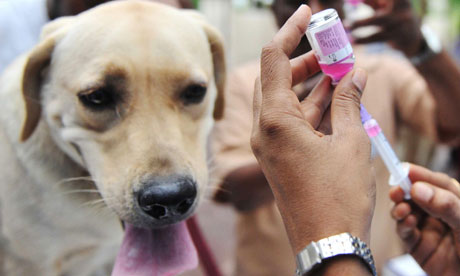
The most effective way of preventing rabies is by vaccinating dogs.
At least one person dies every ten minutes from rabies. This is a shocking statistic for a disease that is nearly completely preventable and virtually eradicated in a number of countries.
Rabies continues to be the cause of an estimated 59,000 deaths every year. Asia and Africa are the worst affected regions by far; 60% of all rabies-related deaths occur in Asia with 35% coming from India alone. Africa has a smaller percentage at 30% but this is still a significant figure.
The Global Alliance for Rabies Control recently published a report, the first to study the effect of rabies on the world today, which states that the disease is currently costing the world economy $8.6 billion.
Why is rabies still a problem?
It is clear that with so many deaths occurring in these countries that correct measures are not being implemented to prevent this disease.
Lack of access to vaccines for people is a serious contributor to this, from either living in a rural area, with only limited medical care, or not being able to afford the vaccine. In some cases, the vaccine costs 40 times more than the average daily income. However the main issue is lack of control over vaccinating dogs and a lack of supervision over the control of the disease as a whole.
There is a lack of surveillance on the administration of vaccines and the effects of rabies on the world. The World Health Organisation (WHO) have stated that rabies in poorer and vulnerable areas of the world is a neglected disease with deaths failing to be reported. This under-reporting of deaths in turn leads to the lack of resources supplied by the international community and therefore the disease continues unchecked.
The most effective way of preventing rabies is by vaccinating dogs, however the proportion of dogs treated in Africa and Asia is far below the necessary amount resulting in a large numbers of domestic dogs carrying the disease.
The vaccination
If you are planning to move to a country known to be affected by rabies, it is highly advisable that you receive the rabies vaccination. You should always check with your doctor or travel nurse prior to departure to discuss your situation.
The vaccination involves 3 injections: the first as soon as possible, the second 7 days later and the third 21 or 28 days after the first dose. The vaccination does not last a lifetime so you will need to receive a booster jab again every year or every three years depending on the initial dosage you were given. This should be discussed with your doctor at the time of your initial vaccination.
Although the vaccine helps to prevent the spread of rabies, you should seek medical attention immediately if you are exposed to the virus. In the event of a bite wound from a rabies-infected animal, the infected area should be washed with soap and water for 10-15 minutes, (do NOT cover it with any dressings), and seek medical assistance. You should receive an additional dose of the rabies vaccination immediately, and a second injection 3 days after the bite occurred.
What is being done?
Both WHO and the Global Alliance for Rabies Control are committed to the elimination of human and dog rabies in all Latin American countries by 2015 and of human rabies transmitted by dogs in South-East Asia by 2020.
